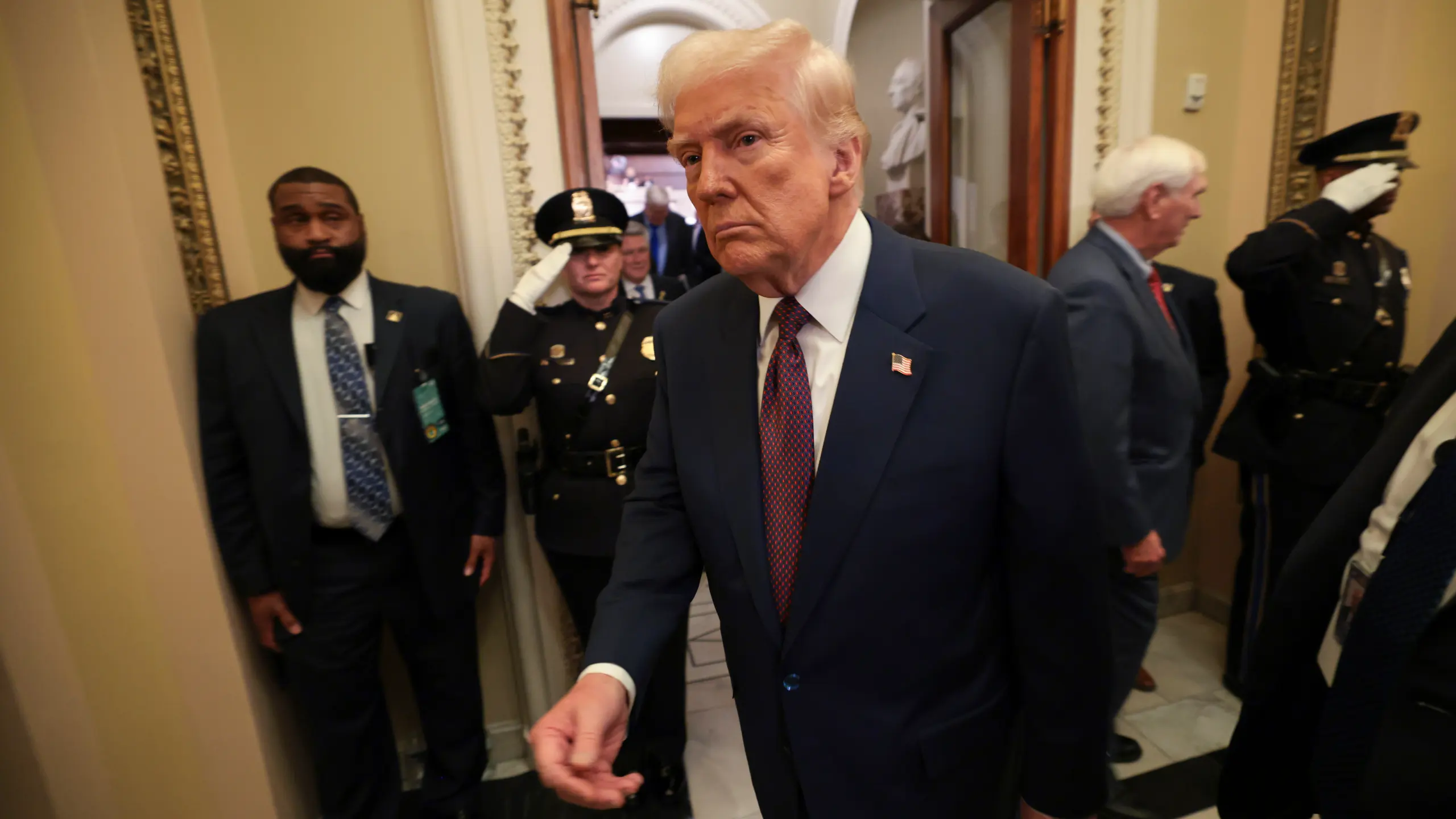WASHINGTON, Nov 5 – Senate Republicans on Wednesday firmly resisted President Donald Trump’s latest attempt to end the nation’s historic government shutdown by eliminating the filibuster, a move that would have allowed the GOP-controlled chamber to pass funding legislation and advance partisan priorities without Democratic support. The president’s demand, delivered at a White House breakfast earlier in the day, was met with polite but resolute pushback from lawmakers, marking a rare instance in which Senate Republicans openly rejected a request from a president they have mostly supported without question.
The U.S. government has now been partially shut down for 36 days, the longest in American history, affecting hundreds of thousands of federal workers and leaving millions of Americans grappling with interruptions in government services. President Trump, addressing a gathering of Republican senators in the White House’s stately East Room, urged them to jettison the longstanding procedural rule, which requires 60 votes to pass most legislation in the 100-member Senate. He framed the elimination of the filibuster as both a practical solution to reopen the government and a political maneuver to swiftly enact election reforms, including a nationwide voter ID law and a ban on mail-in ballots.
“We have to get the country open,” Trump told the assembled senators, according to multiple sources. “And the way we’re going to do it this afternoon is to terminate the filibuster. It’s time.”
Despite the president’s insistence, Republican senators returned to the Capitol with clear messages: the filibuster is not going anywhere. Senate Majority Leader John Thune (R-S.D.) told reporters that he was well aware of the numbers and that the effort to eliminate the rule simply “is not happening.” With the filibuster requiring 60 votes to pass most major legislation, and Republicans holding 53 seats with at least one dissenting vote within their ranks, Trump’s goal would have required support from at least eight Democrats—an unlikely scenario given the current political climate.
Standing firm on the filibuster represents a significant departure from previous instances in which Congress has largely deferred to the president’s wishes. Over the past several years, Republicans have largely overlooked Trump’s unilateral actions on trade, confirmed Cabinet nominees who lacked conventional qualifications, and generally deferred to his policy priorities, even when they deviated from traditional congressional prerogatives.
A Challenging Week for Trump
This confrontation comes at a particularly difficult time for the president. Trump is navigating declining approval ratings among Americans, a wave of Democratic victories in recent off-year elections, and a Supreme Court increasingly skeptical of some of his controversial policy initiatives, including his tariff strategies.
The Senate had already failed on Tuesday for the 14th time to pass a bill to fund government operations. Democratic senators, who retain significant leverage in the chamber due to the filibuster, demanded that any funding agreement include extensions of expiring tax credits to help low-income Americans afford private health insurance under the Affordable Care Act. Republican attempts to push funding through without these concessions have repeatedly stalled, highlighting the limitations of unilateral action even with a narrow GOP majority.
Some hardline Republicans signaled that they might consider Trump’s plan to end the filibuster. Senator Ron Johnson (R-Wis.), a staunch ally of the president, emphasized the strategic dimension of the debate. “Let’s not be schmucks, O.K.? Let’s be smart,” Johnson said. “We know the minute Democrats get a majority in the Senate, they’re going to get rid of the filibuster … So we better beat them to the punch.”
Meanwhile, Republican Senator Josh Hawley (R-Mo.) indicated that he might support ending the filibuster if it meant reopening the government and ensuring that essential services, including food assistance, reached his constituents. “If you’re telling me now, I’m going to have to choose between people in my state eating or preserving the arcane rules of the Senate … I’m going to choose people in my state eating,” Hawley said. His remarks highlighted the tension between adhering to institutional norms and responding to immediate humanitarian needs, a balance that has defined much of the debate over the government shutdown.
Defending the Senate’s Institutional Role
Despite pressure from the president and support from some GOP senators, the majority of Republicans expressed a firm commitment to preserving the filibuster. Senator Thom Tillis (R-N.C.), who announced his retirement last summer after clashing with Trump on healthcare policy, said he would “never vote to nuke the filibuster.” Similarly, Senator James Lankford (R-Okla.) argued that the Senate was intentionally designed to require bipartisan negotiation, providing a stabilizing check in a highly polarized political environment. “We need to be able to maintain a place in government where both sides have to talk to each other. I think that’s good for the country long term,” he said.
Senator Mike Rounds (R-S.D.) acknowledged the president’s point that Republicans could theoretically act on their own if Democrats refuse to cooperate. However, he emphasized that the Senate was meant to facilitate long-term, sustainable solutions rather than short-term political victories. “There’s a lot of us that really think the Senate was designed in the first place to find a long-term, stable solution to problems,” he said. “So we’ll listen to what the president has to say. But now it’s time for our Democrat colleagues to come back.”
The debate underscores the broader tension between the executive branch and the legislative process in Washington. On one hand, the president is increasingly frustrated with procedural rules that constrain his ability to implement his policy agenda unilaterally. On the other, senators are weighing the long-term consequences of dismantling a rule that has historically ensured that both parties must negotiate and compromise on major legislation.
Political Calculus and the Future of the Filibuster
The filibuster, a procedural mechanism that allows a minority of senators to block legislation unless 60 members vote in favor, has long been considered a cornerstone of Senate governance. While Democrats briefly considered eliminating it during the early days of President Joe Biden’s administration, they ultimately opted to retain the rule, recognizing the potential consequences of setting a precedent that could weaken the chamber’s institutional balance.
Republican resistance to Trump’s push highlights the rule’s enduring political and procedural importance, even within a party largely aligned with the president’s agenda. While some senators—like Hawley and Johnson—expressed a willingness to consider eliminating the filibuster in order to achieve short-term policy objectives, a larger contingent remains steadfast in defending the chamber’s traditional role as a forum for negotiation.
As the government shutdown continues to strain federal employees and public services, the political stakes are escalating. Federal workers have faced furloughs or work without pay for over a month, while programs ranging from national parks to administrative services have slowed or halted. Lawmakers from both parties are under pressure from constituents to reach an agreement that will reopen government operations quickly. However, partisan divisions and procedural rules have made a resolution elusive.
For Trump, Wednesday’s setback is part of a broader pattern of political challenges in recent weeks. His efforts to advance policy priorities independently have often collided with institutional constraints, public opinion, and internal party dynamics. While he retains significant influence among Republican voters and certain senators, his capacity to override procedural norms—even within a Republican-controlled Senate—has clear limits.
Looking Ahead
As the shutdown drags on, the debate over the filibuster is likely to continue. The rule’s defenders argue that maintaining bipartisan negotiation is essential for long-term stability in the Senate, while critics contend that procedural barriers are preventing urgent action to fund the government and support vulnerable Americans. The outcome could shape the future of Senate operations, party dynamics, and the balance of power between the executive and legislative branches for years to come.
The standoff also underscores the limits of presidential influence within a complex legislative system. While the White House can propose solutions, rally political allies, and apply pressure, the Senate ultimately operates under its own rules and traditions—rules that a significant number of Republicans are unwilling to discard, even at the urging of a sitting president.
For now, the government remains partially shut down, federal workers continue to face uncertainty, and the broader political debate over the filibuster and Senate norms remains unresolved. Senate Republicans have made clear that they are willing to consider measures to reopen government but are not prepared to abandon a procedural safeguard that has long been viewed as a cornerstone of the chamber’s identity. As negotiations continue, both parties will need to navigate a delicate balance between immediate legislative needs, long-term institutional norms, and the political calculations that define Washington in the 21st century.

Emily Johnson is a critically acclaimed essayist and novelist known for her thought-provoking works centered on feminism, women’s rights, and modern relationships. Born and raised in Portland, Oregon, Emily grew up with a deep love of books, often spending her afternoons at her local library. She went on to study literature and gender studies at UCLA, where she became deeply involved in activism and began publishing essays in campus journals. Her debut essay collection, Voices Unbound, struck a chord with readers nationwide for its fearless exploration of gender dynamics, identity, and the challenges faced by women in contemporary society. Emily later transitioned into fiction, writing novels that balance compelling storytelling with social commentary. Her protagonists are often strong, multidimensional women navigating love, ambition, and the struggles of everyday life, making her a favorite among readers who crave authentic, relatable narratives. Critics praise her ability to merge personal intimacy with universal themes. Off the page, Emily is an advocate for women in publishing, leading workshops that encourage young female writers to embrace their voices. She lives in Seattle with her partner and two rescue cats, where she continues to write, teach, and inspire a new generation of storytellers.









